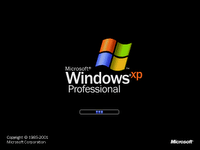Microsoft to kill Windows XP in 800 days & how this affects you


April 8, 2014 is the magical date. Windows XP will officially be considered “End of Life” on that day which means no more security patches, no more hotfixes, no more much of anything related to Windows XP. A lot of customers have been clamoring to the old OS for a while now, and we’ve gotten plenty of special requests to get it loaded onto brand new systems out of spite towards the new Windows Vista and Windows 7 ecosystems. While we could hold off the inevitable for only so long, the hatchet will be burying this walking deadman of an operating system in a very short period of time.

The big questions still linger however. How does this affect the average consumer? Do you have to upgrade right away? I’ll go through the most commonly asked questions passed my way as of late to cut through the confusion.
Q: What will happen on April 8, 2014?
A: Unlike the Y2K scare, this date is more of a formality than anything. When Microsoft considers a products End of Life, it basically tells the world that no more security updates will be released for the product unless they are considered so critical that they will affect a good portion of customers that still utilize the product. Post EOL, this rarely happens for products so I would not count on this as a true means of receiving updates for the OS once it reaches its expiration date. In plain terms, the OS will still function as normal, but you will be duly exposed to any new security threats that arise due to your continued usage of the product. Don’t say Microsoft didn’t warn you. Mind you, Windows XP came out in October 2001. We’re talking 11 years already.
Q: How should I determine if I should upgrade or not?
A: This is not an easy decision to make. In general, we have been telling clients to stick by a few common rules of thumb. If your machine was produced…
Earlier than 2006: The cost to upgrade such an old machine would likely outstrip the functional value of keeping it for any extended period of time. Consider moving to a new machine within the next two years.
Later than 2006: You are likely running Windows Vista or above, and probably have some good shelf life left in this unit. Stick with the OS you have, and you will likely be purchasing a new system with Windows 8 or later when it comes time to upgrade.
Q: My business runs on Windows XP. Should I be concerned?
A: I’m not one to start ringing the alarm too early, but the more important question that lingers is: should I be planning my upgrade path to Windows 7 (or later)? The answer to the second question is a definite YES, as businesses depend on solid and stable patched Windows system to uphold business viability and functionality more-so than consumer, home based systems. While there is never a guarantee that a hacker or naysayer would specifically target your business machines, the likewise holds true as well: they could very well take advantage of these holes to pull information, skim passwords, or cause otherwise undue havoc on operations that could have been avoided. While a slimmer but still present risk exists on any network running computers, this risk is definitely higher with Windows XP due to its age and relative old coding.
Q: My system(s) run(s) Windows XP and I DEFINITELY want to upgrade to Windows 7 before it’s too late. How much will it cost and how long will it take?
A: This is not an easy question to answer, as every Windows XP machine has a different footprint that needs to be fully accounted for when an upgrade is being considered. However, in general, an upgrade of a Windows XP machine that has been in use for over 6 years already will likely run about 3-4 hours of labor. If you have an office of multiple machines that need upgrading, we would need to consider their hardware standing before making the leap to Windows 7 as moving an underpowered machine to a newer OS can sometimes be a mistake. You can view the minimum requirements of Windows 7 for yourself.
Q: Can I move to Windows 7 myself without the help of a company like FireLogic?
A: We always leave this option open for customers. While we do not advise it because it is a tougher upgrade to complete (when compared to Windows Vista to Windows 7), it is possible and can be done. The most popular piece of software that assists in the process is called PCMover from LapLink and many customers have had success with it. It’s not a 100% guarantee of a successful move, but it’s probably your best bet for a DIY migration from Windows XP to Windows 7 in one fowl swoop. For anything other than a simple, slim migration, don’t hesitate to contact us for help and assistance in the move.
There you have it. The emails have been coming in over the past few months and I hope that the majority of concerns were summarized in this Q&A post. If you have singular or multiple systems that are questionable on being capable of being moved to Windows 7, feel free to contact us directly for assistance as we have been helping numerous clients make the transition to Windows 7 as of late. If we feel that you would be better off with new hardware altogether, we won’t hesitate to be honest with you on your upgrade options.
